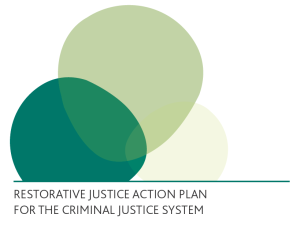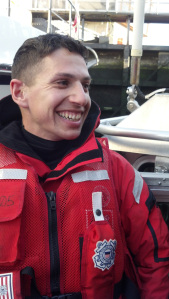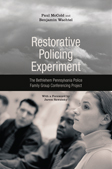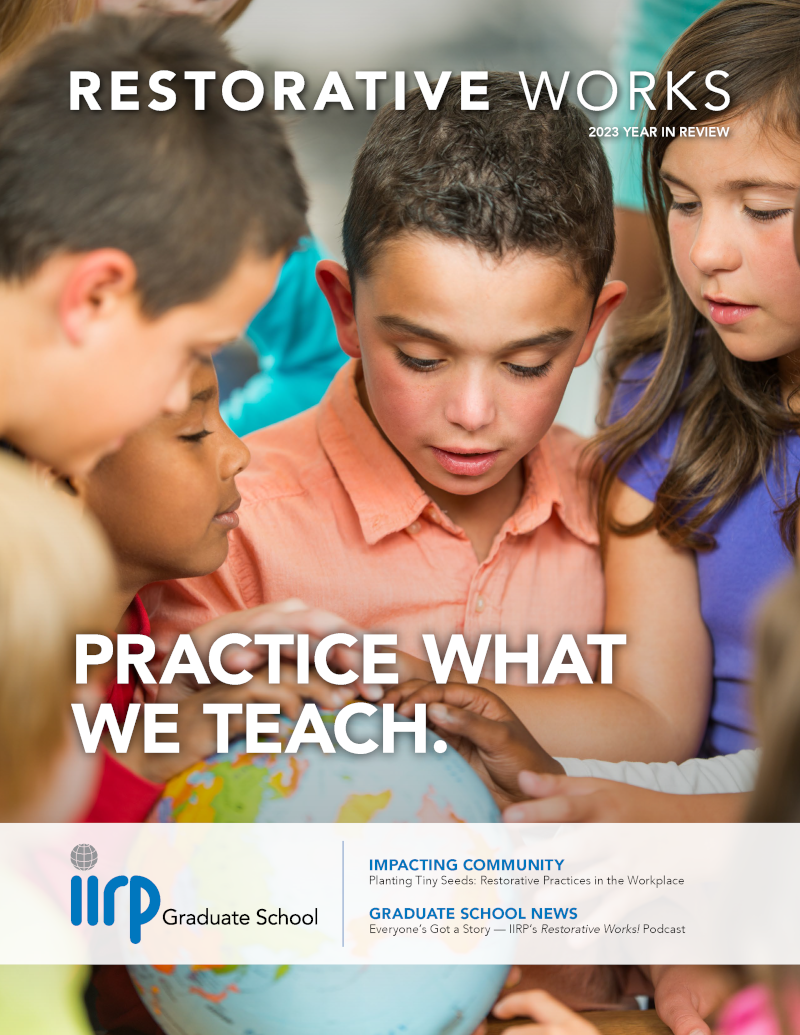News & Announcements
- Details
- Written by Joshua Wachtel
I posted about this a couple weeks ago, but here now from the Guardian is their own wrap-up of what the expert panel had to say during an online discussion about restorative justice.
Restorative justice: live discussion roundup | Social care network | Guardian Professional.
- Details
- Written by Joshua Wachtel
Here's an edited version of a longer film about Rozelle Primary School, which Terry O'Connell mentioned in last week's podcast about his trip to Zimbabwe. The school has been using restorative practices for nearly 10 years.
- Details
- Written by IIRP Staff
 The following comments are excerpted from Theo Gavrielides's blog piece, titled "The McDonaldisation of a community-born and community-led ethos: Reflections on the restorative justice week past." These comments were presented in the context of wrestling with questions of how governments – particularly in light of new policy initiatives to implement more restorative justice for adults in the UK – might avoid the watering down of restorative justice which ultimately belong to communities. The entire piece, which I recommend reading, can be found here.
The following comments are excerpted from Theo Gavrielides's blog piece, titled "The McDonaldisation of a community-born and community-led ethos: Reflections on the restorative justice week past." These comments were presented in the context of wrestling with questions of how governments – particularly in light of new policy initiatives to implement more restorative justice for adults in the UK – might avoid the watering down of restorative justice which ultimately belong to communities. The entire piece, which I recommend reading, can be found here.
- Details
- Written by joshua Wachtel
 CoSA, Circles of Support and Accountability are a restorative practice for working with sex offenders which began in Canada in 1994. Now some in Bermuda, according to this article, would like to see the practice introduced there.
CoSA, Circles of Support and Accountability are a restorative practice for working with sex offenders which began in Canada in 1994. Now some in Bermuda, according to this article, would like to see the practice introduced there.
Bermuda’s justice system is due for change in its approach to cases of sexual abuse, according to children’s welfare campaigner Sheelagh Cooper.
In a bid to transform the way Bermuda treats its most dangerous criminal offenders, Ms Cooper has joined forces with the Women’s Resource Centre to bring restorative justice experts to the Island.
- Details
- Written by Joshua Wachtel
 The Restorative Justice Council in the UK published this significant bit of news this week:
The Restorative Justice Council in the UK published this significant bit of news this week:
The Ministry of Justice set out a strategy to build access, capacity and awareness of restorative justice across the Criminal Justice System, in a Restorative Justice Action Plan, published today at the start of International Restorative Justice Week.
A recent Joint Justice Inspectorates report found that restorative justice in the UK is limited by 'patchy' availability across the country, gaps in access across the stages of the justice system and inconsistent quality of restorative justice being delivered. This action plan aims to tackle these limitations.
- Details
- Written by Joshua Wachtel
 Nicholas Bradford describes himself as a lifelong student of conflict and education at his new blog, "Restorative Justice – in the Puget Sound". In a post from November 8, titled "Restorative Justice in the Coast Guard?? Really? Yes, really!!" Bradford describes a situations in which a "physical altercation resulted from continued verbal sarcasm/jokes (harassment)." The normal discipline procedure would involve formally documenting the case. "If this were a serious offense the members could have been 'Masted,'" writes Bradford, "which is a formal hearing by the CO [commanding officer]. There are no lawyers or burden of proof (similar to principal’s freedom). The members could be confined to the base, they could be sanctioned pay, and/or they could be demoted.
Nicholas Bradford describes himself as a lifelong student of conflict and education at his new blog, "Restorative Justice – in the Puget Sound". In a post from November 8, titled "Restorative Justice in the Coast Guard?? Really? Yes, really!!" Bradford describes a situations in which a "physical altercation resulted from continued verbal sarcasm/jokes (harassment)." The normal discipline procedure would involve formally documenting the case. "If this were a serious offense the members could have been 'Masted,'" writes Bradford, "which is a formal hearing by the CO [commanding officer]. There are no lawyers or burden of proof (similar to principal’s freedom). The members could be confined to the base, they could be sanctioned pay, and/or they could be demoted.
In this situation, however, the CO, "After having several conversations with his staff and the members involved, both those in the altercation and the members who witnessed it, he assigned an apology letter and a learning opportunity to the members." The letters they wrote focused on the harassment policy and the impact their actions had on the junior shipmate who witnessed and reported the incident.
Then Bradford writes, "What I find remarkable is the next step. The Commanding Officer asked both members to read their work in front of the whole Station."
- Details
- Written by Joshua Wachtel
What are Restorative Practices? from Christin Clark on Vimeo with students from Philadelphia, teacher Neil Geyette, formerly of West Philadelphia High School, and IIRP trainer Steve Korr.
- Details
- Written by Joshua Wachtel
I'm afraid I caught wind of this a bit too late to participate or to spread the word. However, I still think it's noteworthy to point to an online discussion hosted by the Guardian newspaper in the UK that took place earlier today in the comments thread of the following post: Restorative justice: live discussion. The link I've posted will allow you to scroll down and read through the entire thread.
- Details
- Written by Joshua Wachtel
 Wipf & Stock Publishers have just republished "The Bethlehem Pennsylvania Police Family Group Conferencing Project" by IIRP founding professor Paul McCold, now adjunct professor at Simon Fraser University School of Criminology, and IIRP director of technology Benjamin Wachtel. Reissued with the title Restorative Policing Experiment, the volume takes its place Wipf & Stock's new Restorative Justice Classics series. The book announcement says:
Wipf & Stock Publishers have just republished "The Bethlehem Pennsylvania Police Family Group Conferencing Project" by IIRP founding professor Paul McCold, now adjunct professor at Simon Fraser University School of Criminology, and IIRP director of technology Benjamin Wachtel. Reissued with the title Restorative Policing Experiment, the volume takes its place Wipf & Stock's new Restorative Justice Classics series. The book announcement says:
The Bethlehem Police Family Group Conferencing Experiment was the first randomized trial of restorative justice in the United States. Moderately serious juvenile offenses were randomly assigned either to court or to a diversionary "restorative policing" process called family group conferencing. Police-based family group conferencing used trained police officers to facilitate a meeting attended by juvenile offenders, their victims, and their respective family and friends. This group would discuss the harm caused by the offender's actions and develop an agreement to repair the harm.
- Details
- Written by Joshua Wachtel
This announcement comes from the Correction Services of Canada:
The theme for Restorative Justice Week 2012, which will be held November 18-25, 2012, is “Diverse Needs; Unique Responses”. This theme recognizes that restorative justice is an approach that addresses the various needs of people impacted by crime and conflict that are created when a person has been harmed or treated unfairly. Restorative justice processes, in response to crime and conflict, are highly adaptable to different people, environments, and systems as the identified needs of the people involved help formulate the unique response that can contribute to a person’s sense of safety, justice and well-being. Read our introduction letter for more information on this year’s theme.

Restorative Works Year in Review 2023 (PDF)
All our donors are acknowledged annually in Restorative Works.

